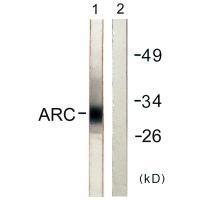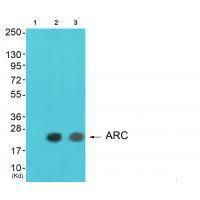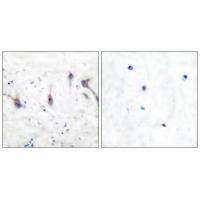


| WB | 咨询技术 | Human,Mouse,Rat |
| IF | 咨询技术 | Human,Mouse,Rat |
| IHC | 1/50-1/100 | Human,Mouse,Rat |
| ICC | 技术咨询 | Human,Mouse,Rat |
| FCM | 咨询技术 | Human,Mouse,Rat |
| Elisa | 咨询技术 | Human,Mouse,Rat |
| Aliases | Myp; NOL3; Nop30; Nucleolar protein 3; apoptosis repressor ARC |
| Entrez GeneID | 8996; |
| WB Predicted band size | 23kDa |
| Host/Isotype | Rabbit IgG |
| Antibody Type | Primary antibody |
| Storage | Store at 4°C short term. Aliquot and store at -20°C long term. Avoid freeze/thaw cycles. |
| Species Reactivity | Human |
| Immunogen | Synthesized peptide derived from human ARC. |
| Formulation | Purified antibody in PBS with 0.05% sodium azide. |
+ +
以下是3篇关于ARC抗体的代表性文献摘要(已简化内容):
1. **文献名称**: *ARC, a critical regulator of synaptic plasticity and memory formation*
**作者**: Plath N, et al.
**摘要**: 研究聚焦ARC蛋白在突触可塑性中的作用,利用特异性抗体验证其在记忆形成相关的神经元活性依赖性表达模式,证实ARC通过调节AMPA受体内化影响长期记忆。
2. **文献名称**: *Development of a monoclonal antibody specifically recognizing human ARC protein*
**作者**: Li Y, et al.
**摘要**: 报道一种针对人源ARC蛋白的单克隆抗体的开发与验证,证明其在免疫印迹、免疫荧光中的高特异性,为癌症细胞凋亡研究提供可靠工具。
3. **文献名称**: *ARC interacts with caspase-8 to regulate apoptosis signaling*
**作者**: Koseki T, et al.
**摘要**: 通过免疫共沉淀(使用ARC抗体)发现ARC与caspase-8相互作用,抑制死亡受体介导的凋亡通路,揭示其在细胞存活中的分子机制。
**Background of ARC Antibody**
The apoptosis repressor with CARD (caspase recruitment domain) domain (ARC), encoded by the *NOL3* gene, is a endogenous anti-apoptotic protein predominantly expressed in cardiac and skeletal muscle, as well as certain cancer cells. Discovered in the late 1990s, ARC functions as a key regulator of programmed cell death by interacting with apoptotic signaling pathways, including extrinsic (death receptor-mediated) and intrinsic (mitochondrial) pathways. It inhibits caspase activation, neutralizes pro-apoptotic proteins like Bax and Fas, and blocks death-inducing signaling complexes, thereby promoting cell survival under stress conditions such as ischemia or oxidative damage.
ARC’s role in cardiovascular protection has been extensively studied, with its downregulation linked to heart failure, myocardial infarction, and reperfusion injury. In cancer, elevated ARC expression is associated with tumor progression, therapy resistance, and poor prognosis, making it a potential therapeutic target.
ARC antibodies are essential tools for detecting ARC protein levels in research and diagnostics, aiding in understanding its expression patterns in diseases. Therapeutic strategies using ARC-targeting antibodies or inhibitors are under preclinical exploration to sensitize cancer cells to apoptosis. However, challenges remain, including tissue-specific expression and off-target effects. Overall, ARC antibodies hold promise for both mechanistic studies and translational applications in cardiology and oncology.
×